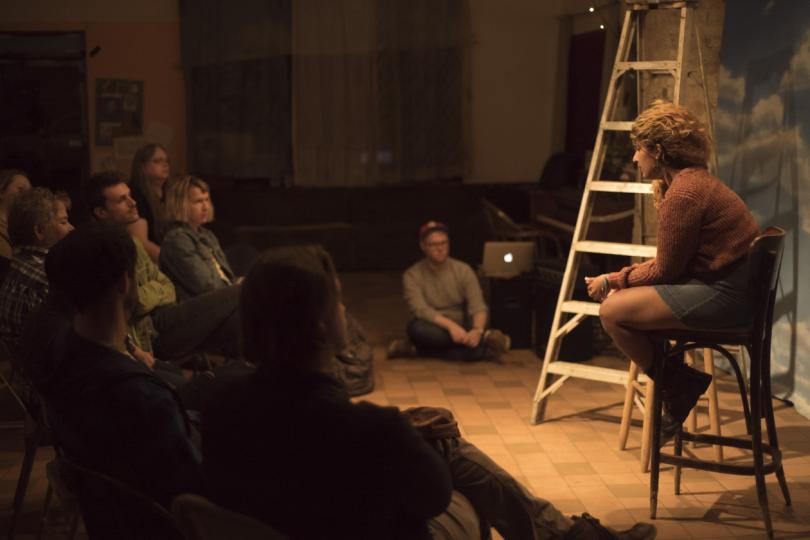Failing Forward

Editor's note: This article marks the first in an ongoing series called "In the face of Adversity" - an exploration of stories in the performing arts about groups or individuals overcoming what can seem like insurmountable odds. If you have a story you'd like to contribute please contact Damon Runnals.
(The following is adapted from a speech presented at the MTASTC conference in a plenary session entitled “Failing Forward.”)
It’s happening again, this time at Intermedia Arts. Another venue is collapsing, right around our ears. Patrick’s Cabaret has been officing in the ArtsHub West space at Intermedia Arts since May of 2016.
Raise your hand if you’re thinking, “I thought Patrick’s Cabaret was in the firehouse on Minnehaha?”
Raise your hand if you’re thinking, “I thought Patrick’s Cabaret closed?”
Raise your hand if you’re thinking, “Well, what will you do now?”
What will we do?
We’ll carry on.
I started working with Patrick’s Cabaret just months before we were told the lease was being terminated (through no fault of our own). It was my first regular gig since Bedlam. Bedlam’s collapse was protracted and excruciating, with debts to artists racking up alongside debts to contractors and landlords, and for a time I was the Interim Managing Director, fronting the financial triage and trying to find the most ethical way through. While I wasn’t much involved in the move and the crisis at Patrick’s Cabaret, just being within the orbit of another capsizing organization was incredibly emotional for me. I don’t know if you’ve ever had nightmares about payroll, but if you have, you know what I’m talking about.
But Patrick’s Cabaret didn’t capsize. What could have been a story of failure and demise was instead a story of adaptation and a return to form. A perfect storm held the organization afloat: First, the small and dedicated Board was made up of both the community the Cabaret had historically served and the community it was striving to center. Second, Patrick’s Cabaret was already in the midst of participating in ArtsLab, an incredible program that pulls nonprofit leaders out of the weeds, lets them catch their breath, and facilitates strategic planning in community with peer organizations. Third, Macalester College professor Harry Waters Jr decided to throw his unique energy and passion into a summer long conversation series - “Sustaining Creative Resources” was about not just the loss of the firehouse, but about reconnecting to what artists need and how to sustain ourselves. And finally, likely most importantly, the community just would not give up. Executive Artistic Director Scott Artley didn’t and doesn’t shy away from the hard questions - “Can Patrick’s Cabaret sustain itself without a venue?” “Is there still a need for Patrick’s Cabaret? Why?” All these components allowed Patrick’s Cabaret to go mobile instead of going under.
When I joined the organization as the Associate Director in January, the first thing Scott handed me was something almost like a thesis. The “Key Messages and Strategic Direction” document was a result of all the work the Board and community had put into those Sustaining Creative Resources conversations and the ArtsLab process. The mission had changed, now explicitly naming the organization as “queer-led” and supporting artists “on the edge of culture.”
There’s more, but I won’t repeat it all. It’s comprehensive. It covers Patrick’s Cabaret’s programming, history, an FAQ (“Who’s Patrick? Where’d he go?” - probably questions you’re asking yourselves now), and an overview of the strategic direction for the organization in the coming year.
After 30 years, a lot has changed. But in some ways this new mobile iteration of Patrick’s Cabaret marks a return to form. Patrick Scully, an out gay man living with HIV, invited artists to join him for an evening of works in progress in the basement of a Catholic school back in 1986. In the midst of the Reagan Era, the Culture Wars, and some of the darkest days of the AIDS crisis, the evening proved so successful, and the need for a performing venue to support raw, experimental, challenging work so great, that Patrick’s Cabaret grew rapidly into an essential community resource.
Now, more than thirty years later, Patrick’s Cabaret is still supporting raw, experimental work, and we’re striving to center the voices that are as far to the edge of culture as Patrick Scully was in 1986. Some of the programs have changed, but the framework remains the same.
Venues are more than a space to perform in
And spaces to perform exist beyond venues
Spaces to perform and create exist beyond eponymous venues. Nearly every arts organization here started outside of a venue, and we don’t need to fear the mobile lifestyle. Patrick’s Cabaret is bigger than our office at Intermedia Arts, just as Intermedia Arts may continue to exist beyond its building. Theatres and arts centers are welcoming spaces for those of us who need them. And artists need space. But it’s also true that venues are more than a space to perform in. They are symbols of a community’s values.
Institutions are bigger than the people who run them
And people are bigger than the institutions they run
Patrick’s Cabaret is so much more than its staff, more than its programs, and so is Intermedia Arts. Both organizations have changed the landscape, have offered fertile soil for artists to grow in, and have developed audiences hungry to push boundaries. The artists who have made Intermedia Arts and Patrick’s Cabaret what they are, who have played within and changed the rules of our frameworks, they exist beyond our institutions and they bear those legacies forward. And artists need support. But institutions are bigger than individuals, and how they treat artists is indicative of a community’s values.
So what will we do?
We will carry on.


